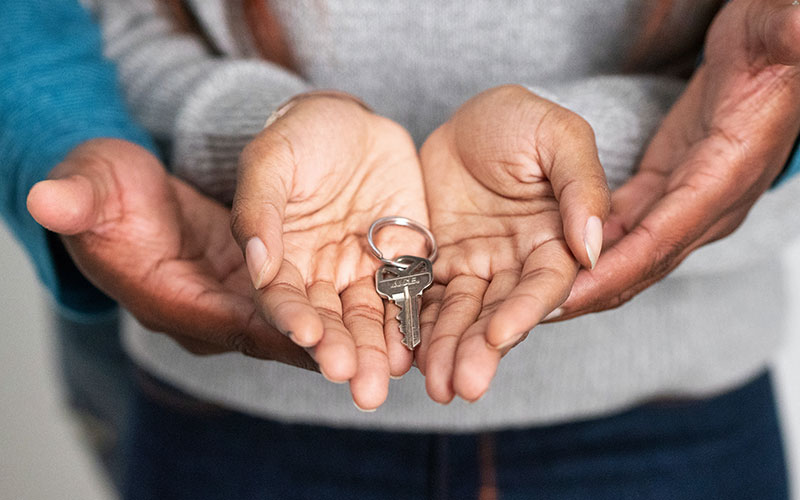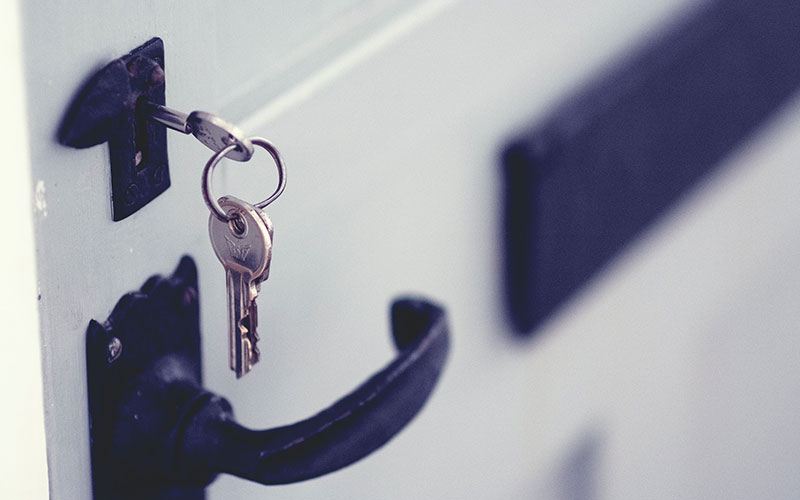In the early days of the COVID-19 pandemic, thousands of rough sleepers across Victoria were provided with temporary accommodation in hotels, motels and empty student housing.
To the relief of many, the short-term program was extended to April 2021 - and the benefits were astounding.
Not only did accommodation provide safety amidst the pandemic, but it provided people with stability, enabled better access to support services, and ultimately gave people a chance to get back on their feet.
So what happens now that the program is winding up?

Homeless to a Home: a new initiative
CatholicCare Victoria is one of many organisations across the state who have been funded to run a new program - Homeless to a Home.
Homeless to a Home is a State Government initiative in response to the COVID-19 pandemic, supporting those who were provided with emergency accommodation to find permanent housing and long-term stability, amidst other essential supports.
Working together with Uniting, our Homeless to a Home program was launched in March this year and will provide 74 packages to individuals and families within the Central Highlands, Wimmera and South West regions of Victoria.
These packages offer two years of ongoing support, which include long term accommodation (either via head leasing, public housing or social housing), wholistic case management to identify and address issues/barriers (including employment help), financial assistance and brokerage to purchase home goods, and referrals to counselling, general practitioners and other essential supports.
“The long-term goal of this program is to build clients’ capacity, stabilize their housing and provide opportunities to live full and productive lives,” says Virginia Louey, Homelessness Support Services Manager at CatholicCare Victoria. “All people are part of a community, homeless people however become marginalized and cannot be fully integrated and have the opportunity to contribute.”
People who were provided with emergency hotel/motel accommodation during the COVID-19 pandemic, and who were linked with a homelessness provider in one of the three regions, are eligible to receive a package through our Homeless to a Home program.
Unfortunately there are significantly more eligible clients on homelessness provider lists than we can allocate packages to. But in consultation with these providers, together we have identified the most vulnerable people in need to access the program, and they are already receiving support.
“We’ve already housed 12 people,” says Emma Lipplegoes, Homeless to a Home Case Coordinator. “In my years of work, I’ve never been able to house so many people in such a short amount of time.”

Providing long-term stability
Homelessness often goes hand in hand with issues including mental illness, drug and alcohol abuse, and family violence.
A safe and secure home is the first step in addressing these issues, and is a way forward for people experiencing homelessness.
“We’ve never had a program like this,” says Emma. “Many of the people we’re supporting have been homeless for over a decade. Mental health issues are one of the most common problems I see, but drug and alcohol abuse, and family violence, are common too.”
In the Ballarat region, there are many varying cohorts of individuals and families experiencing homelessness, but the largest demographic is single males - this is also true for the people we’re supporting through the Homeless to a Home program.
One man in his thirties who has just recently received a Homeless to a Home package, Michael*, has been homeless for 10 years. He lives with an intellectual disability, and drug use is also part of his story.
“When I first met Michael, he wouldn’t look at me. But the first time I went to visit him in his new unit, he was so different; he was happy. His unit was so tidy and he’d even made his bed – which may sound like such a simple thing, but this was huge. Michael hadn’t had a bed for 10 years. It means so much to him,” says Emma.
“Right before Michael moved into his new home, he had an accident which resulted in a bad open wound. If he were still living on the street, this would have likely become infected. And if left untreated, the outcome would have had a massive impact on his health. This housing has given him the ability to look after and care for the wound, and it’s now healing well.”
The immediate benefits of the Homeless to Home program are clear, but the long-term support is where we can really change lives.
Emma is providing ongoing support for Michael, including making an NDIS application for employment help, and she is also currently supporting another 21 clients within the program.
“I see so many different cohorts of people within the Homeless to a Home program – families, men and women. Their mental health and wellbeing needs are often quite complex, and if that’s the case then we provide them with referrals to psychologists or psychiatrists, or take them to a local GP. Many haven’t seen a doctor in years... We cover the fees of these services through the program, because when they come off the street they have nothing,” says Emma.
“Stable housing is a basic human need. Once a person’s housing needs are met, they are able to explore other options, think bigger and focus on the future,” says Virginia. “Benefits include improved health outcomes, reduction in mental health issues, and opportunities for education and employment. On a personal level I am excited to be part of this initiative, and see this could be a whole new way of supporting vulnerable people long-term.”
“This program… it’s life changing for these clients,” says Emma.
To enquire about the Homeless to a Home program, contact our head office in Ballarat on (03) 5337 8999.
Liz Gellel | Communications Coordinator
*At CatholicCare Victoria, we respect everyone who comes to us for help and many are working towards a fresh start in life. While the stories and quotes are true, client names have been changed to protect their privacy.
Read more: